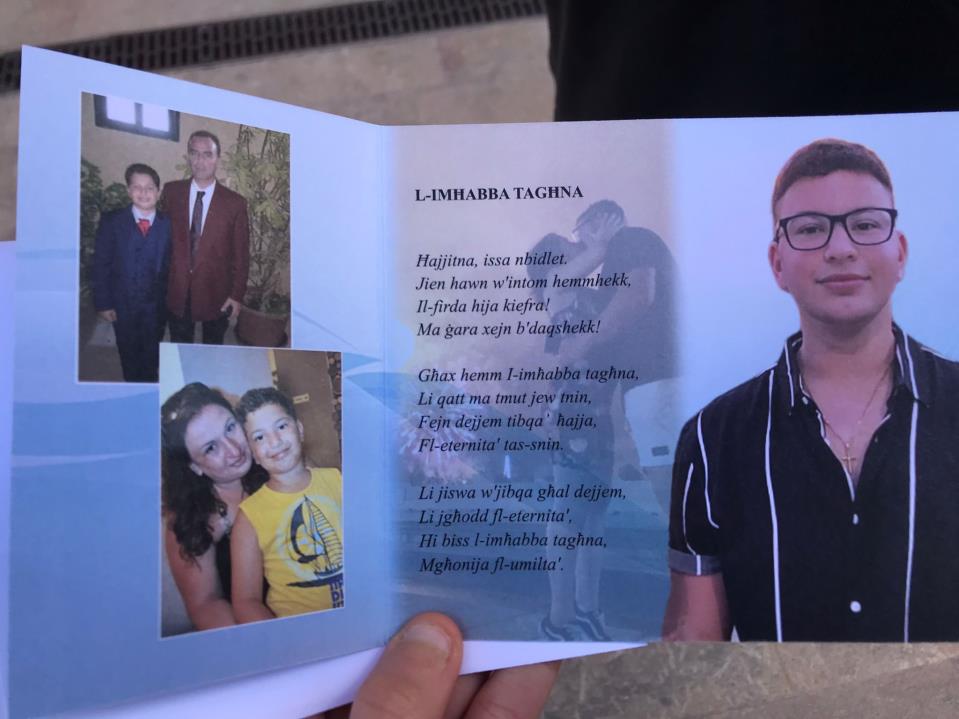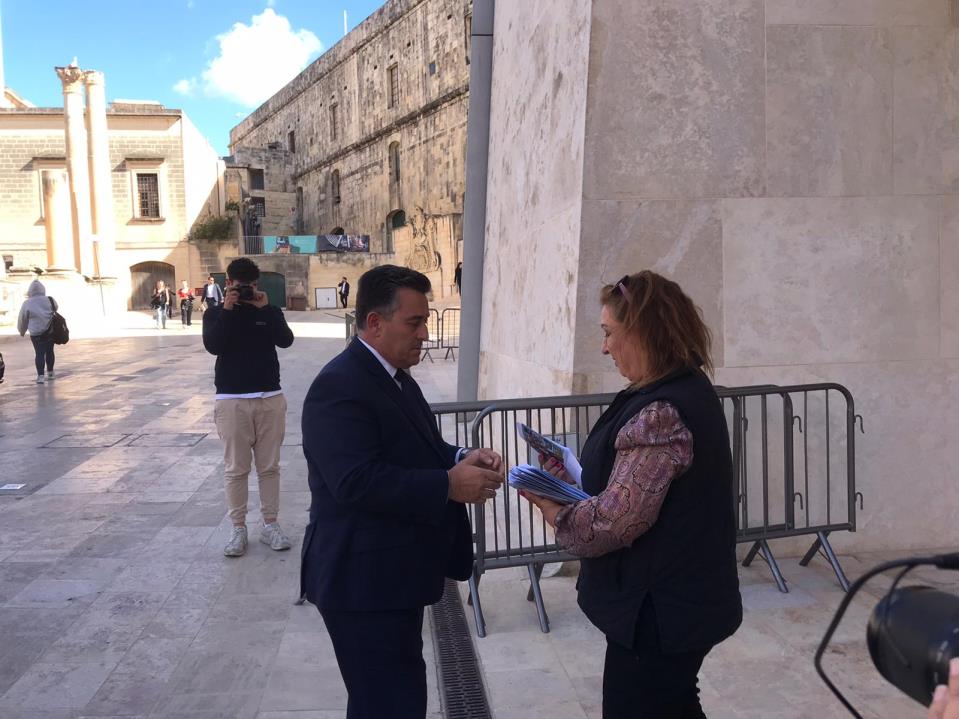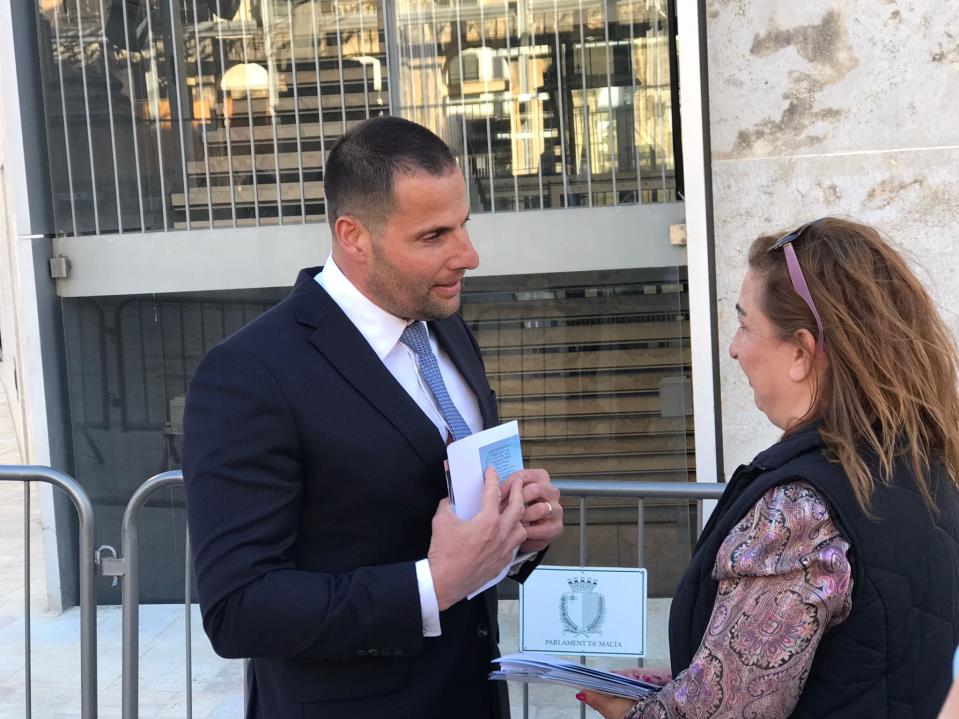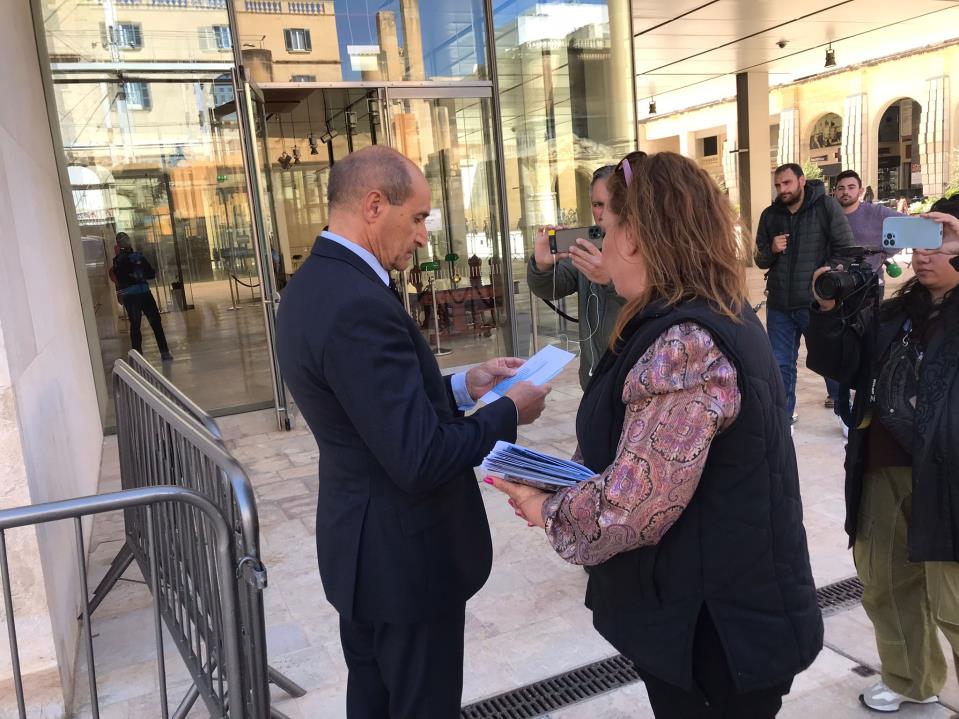The mother of construction collapse victim Jean Paul Sofia handed out a letter and holy pictures of her son to MPs as they walked into Parliament on Monday, while a Nationalist Party motion for the appointment of a public inquiry into Sofia’s death to be discussed urgently was refused.
Isabelle Bonnici handed the letter, together with holy pictures (santa tal-mejtin) of her son, to MPs as they walked into Parliament on Monday as it convened for its first day after the Easter recess.
Many PN MPs, including party leader Bernard Grech, stopped to speak to her. Labour MPs also accepted the letter but were unmoved by her pleas for a public inquiry, with backbencher Randolph Debattista particularly emphasising on the ongoing magisterial inquiry instead before walking into Parliament.
Sofia died at the age of 20 in the collapse of a partially built factory in the Corradino Industrial Estate in December last year. Nobody has been charged in connection with the collapse yet, with a magisterial inquiry still ongoing.
The family’s and the PN’s calls for a public inquiry into the death have been rebuffed by the government, which continues to insist that the magisterial inquiry will provide justice.
Prime Minister Robert Abela was among those who Bonnici met and spoke to outside Parliament. He told Bonnici that the magisterial inquiry has all the tools necessary to make sure that justice is done and again lamented at the fact that after five months, it was still open.
He said that he would continue to insist for the magisterial inquiry to be completed as he, like her, wanted to see the pain caused to her lessen and for anybody who is responsible to face the consequences of what happens.
Abela said that he believes that her ultimate wish is that those who were responsible answer for their shortcomings.
The Prime Minister said that if there are shortcomings in the system, then the inquiring magistrate will identify them – but Bonnici continued to insist that a public inquiry would be the best way for this to be done.
Closing the five-or-so minute conversation, Abela said that his advice to her was to not let anyone “capitalise” on her pain.

The letter which Bonnici handed out to MPs read that the mother was writing in order to share a “genuine message from the heart of a suffering parent who wants justice for her son” and who wants reforms and enforcement in the construction sector.
She shared her appeal for a public inquiry into her son’s death, saying that it seems like the public want this as well.
“In a democratic country, Parliament is elected to listen to and serve the people, and your vote in Parliament should be a weapon to defend what is right,” she told MPs.
“Are you going to deny justice from the Maltese people? Are you going to deny the possibility for parents to have their minds at rest when they children go to work?,” she said.
“I cannot stop with just the magisterial inquiry; the past has showed this. I want there to be a more intensive detailed investigation that a magisterial inquiry would not do,” she continued.
“The magisterial inquiry only leads to criminal justice, and that’s only if it finds that there was a crime. It is only the public inquiry which can lead to administrative justice and would lead to a reform so that weak and bad practices are strengthened with respect towards life and the security of the people,” she continued.

She said that she is “paying the price for life” and that her only consolation is that she loved and will continue to love her son till the end.
She said that she is certain that many of the MPs will try to understand her, both if they know how to love, and especially if they are parents.
“I ask in the name of justice to vote according to your conscience when the motion on the request for a public inquiry is presented and discussed,” she said.
She said that her son was the “sacrificial lamb” because the building which collapsed had so many shortcomings that it could have led to an even bigger tragedy.
“You have the choice and obligation to not let my son and others die in vain,” she said.
She told MPs that her request isn’t one which is motivated my political colours: “I can assure you that when you spend 15 hours waiting for them to retrieve your son or your mother from under the rubble, there is no colour left except for black,” she said, before questioning whether it was possible that MPs were willing to take a risk on another son or mother.
“I am ready to meet with whoever wants to talk to me. It is in your hands now! In the hands of each and every one of you. Jean Paul is a Maltese citizen, and your son too. Don’t forget!,” she concluded.

Meanwhile, inside Parliament, PN leader Bernard Grech referred to Bonnici and the documents she was handing out to MPs outside and said that he was tabling a motion under Parliament’s standing procedures for Parliament to adjourn so that it discusses her request for a public inquiry a matter of importance.
Labour Whip Andy Ellul said that while his side of the House shows “compassion” to Jean Paul Sofia’s mother, the Opposition leader had “every right” to put forward a motion during the Opposition’s allotted time in Parliament but chose not to do so.
Grech said that it is to be taken that the government disagrees with discussing this motion, while Ellul retorted that he was speaking about parliamentary procedure.
Speaker Anglu Farrugia adjourned the sitting to pass a ruling on the motion.
While the sitting was adjourned, the Labour Party in a statement accused Bernard Grech of playing a partisan game even with Sofia’s death.
The party said that the PN had a chance to discuss the matter on 16 March, but instead decided to discuss something else.
That “something else” was a motion on the Steward Health Care concession for three hospitals which the court had cancelled some days prior.
The Labour Party said that it was ready to discuss the Opposition’s motion about the subject, and that had Grech brought the matter up when he could have then the discussion would have already happened.
“But the Opposition leader wants a political game, not a serious discussion,” the PL said.

The PL said that so much is this the case that the party still hasn’t joined the Prime Minister’s appeal for the magisterial inquiry to be closed without delay so that justice can be done with the family and society.
“Justice is done when everyone who must shoulder responsibility – criminal or civil – goes through a judicial process, and the inquiry has all the necessary tools and powers to identify all those responsible,” the party said.
The Speaker said that in considering the motion, when a request was filed under this permanent order it always looked at whether the matter is defined, of public interest, and urgent. He said that the matter at hand satisfied the former two – that it was defined and of public interest.
However, the urgency aspect is also important, he said, noting that this means that it must be urgent enough for a debate to be held in that moment, otherwise it would be too late.
Farrugia noted that the magisterial inquiry into the case is still ongoing, and that if the debate were to be held now, then there is no guarantee that it can be done without prejudicing this inquiry.
He quoted previous rulings by past Speakers which said that allowing a discussion on open investigations could compromise those same investigations, the judicial process in the inquiry, and any future charging of an accused.
Farrugia also noted that the PN had filed a similar motion to call a public inquiry on 7 March, and noted the government’s points that the PN chose not to discuss the motion on its first available day on 16 March.
The Speaker said that there have been no developments that render the matter as being urgent enough to suspend the work of the House as it would be otherwise too late to discuss.
He said that he was following previous precedents said and the standing orders of the House and that therefore the motion to discuss the matter urgently was being refused.